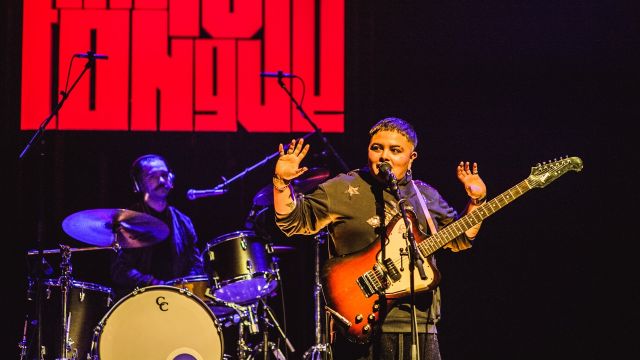Native Tongue
Singer-songwriter, Mojo Juju, was nominated at the 2018 ARIAs as Breakthrough Artist of the Year. Her third studio album, Native Tongue won Album of the Year and Song of the Year at the 2019 National Indigenous Music Awards. The song also won Best Independent Single at the Australian Independent Record Labels Association Awards. The accolades are justly the result of four year’s work on an album, a body of work that is a very personal collection of stories about the experiences of her family and her fascinating heritage. Born in regional NSW, Mojo’s father has Filipino and Spanish roots and her mother has Wiradjuri and European heritage. Native Tongue is a powerful song about her regrets at not having learned her father’s language. Other songs tell of personal experiences of life, encountering and combating racism, and the journey to discover and give a voice to her family history. Her love of family is deeply felt. Pidge (Jackie interlude) is a love song for her Grandmother, Pearl from the Grandfather who was not allowed to be part of the family because of his skin colour; Shut Your Mouth andCold Condition allude to racist encounters and the atmosphere she felt in the lead up to the same-sex marriage vote; and Don’t Stop Me Now celebrates the empowerment of embracing your cultural heritage and fighting your natural instinct to remain silent.
 Mojo is a natural storyteller and the large collection of songs are each introduced by anecdotes or explanations of the process behind the song’s creation. Other family members introduce their parts with pre-taped narrations and photo montages. Her brother Steve is the only other musician on stage – accompanying Mojo’s guitar and looper pedal with drums and electro beats. Their bass player joins them electronically for this tour. Mojo and Steve are joined by soulful singer Joshua Tavares and hip hop and soul artist, Mirrah. There is also a harmony group providing beautiful soulful voices.
Mojo is a natural storyteller and the large collection of songs are each introduced by anecdotes or explanations of the process behind the song’s creation. Other family members introduce their parts with pre-taped narrations and photo montages. Her brother Steve is the only other musician on stage – accompanying Mojo’s guitar and looper pedal with drums and electro beats. Their bass player joins them electronically for this tour. Mojo and Steve are joined by soulful singer Joshua Tavares and hip hop and soul artist, Mirrah. There is also a harmony group providing beautiful soulful voices.
The Clancestry programme at QPAC celebrates the diversity and richness of our First Nations people. And Mojo’s set is a fitting mix. The combination of styles is startling and fresh – there is R‘n’B, Blues, Hip Hop, Rap, and outright Rock and Pop. The only element I found missing from Mojo’s self-penned history was the story of her discovery of music as an allied force in her self-survival. I would love to know more about the musical members of her clan and how they influenced her own development as a singer-songwriter and guitarist. Mojo’s story does not acknowledge other immigrant experiences – and I wonder does she realise that her stories speak to the wider migrant experience too? Her story is powerful because it mirrors many others in the Australian melting pot – be it Welsh, Greek, Italian, German, Chinese, Vietnamese and so on – and the audience’s emotional reaction to her performance attest to this – even the so-called ‘white’ members of the crowd. We can all identify with the connection to family. When Mojo talks about the blockade on indigenous languages, I can imagine the frustration of my own ancestors being denied their Welsh language. And of course the First Nations people in attendance have a more recent anguished experience. One thing is for sure, for everyone who has felt like an outsider for ethnicity, sexuality or other reasons, Mojo’s songs speak to us all – loud and clear.
Beth Keehn
Photo credit: Courtesy of QPAC
Subscribe to our E-Newsletter, buy our latest print edition or find a Performing Arts book at Book Nook.

